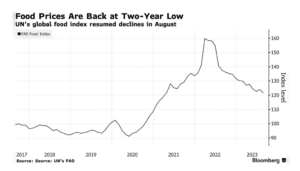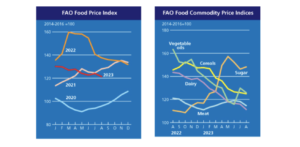Bloomberg's Leah Nylen reported Thursday that "a Colorado judge issued an order temporarily blocking the proposed $25 billion merger of Kroger Co. and Albertsons Cos., which has been challenged by…
Global Food Prices Decline in August- Lowest in Two Years, But Rice at 15-Year High
Bloomberg writer Agnieszka de Sousa reported today that, “Global food prices resumed declines to the lowest in more than two years amid ample supplies of cooking oils and dairy, even as worries persist over flows of key staples from some regions.

“An index of food-commodity costs fell 2.1% last month on subdued demand and good output of vegetable oils and milk, the United Nations’ Food and Agriculture Organization said Friday. The gauge has slid 24% since hitting a record in March 2022, when Russia’s invasion of Ukraine disrupted grain exports.”

The Bloomberg article explained that, “Grains have been a big driver of the retreat since last year. A second bumper Russian wheat harvest has helped temper prices, and Ukrainian exports continue to flow despite the end of a Black Sea grain deal and repeated attacks on its ports. The US is also forecast to collect a near-record corn crop, although extreme heat at the end of the growing season risks curbing yields.”
And Reuters writer Gus Trompiz reported today that, “The United Nations food agency’s world price index fell in August to a new two-year low, reversing a rebound seen the previous month, as a decline in most food commodities offset increases for rice and sugar.”
The Reuters article noted that,
The drop in the overall index reflected declines for dairy products, vegetable oils, meat and cereals, despite a jump in FAO’s rice benchmark to a 15-year high following Indian export restrictions, the agency said.
Trompiz pointed out that, “FAO’s cereal index edged down 0.7% from July as wheat prices fell in the face of northern hemisphere harvests while maize (corn) fell for a seventh straight month to a near three-year low, pressured by a record Brazilian crop and the approaching U.S. harvest, it said.
“In contrast, the agency’s rice index surged by almost 10% month-on-month as India’s decision in July to ban Indica white rice exports disrupted trade at a time of tight availabilities ahead of new-crop harvests, FAO said.”
The article added that, “In a separate report on cereal supply and demand, the FAO forecast world cereal production this year at 2.815 billion tonnes, down slightly from a previous estimate of 2.819 billion.”
Dow Jones writer Yusuf Khan reported today that, “Food prices fell in August as a strong supply of wheat, corn and other key foodstuffs helped to lower global food commodity prices, but risks remain for rice, the cost of which jumped after the introduction of Indian export restrictions, the Food and Agriculture Organization of the United Nations said Friday.”
Khan indicated that, “[T]he UN FAO highlighted skyrocketing prices for rice, with its price index up 9.8% during the month–hitting a 15-year high–following significant trade disruptions after India introduced a ban on exports for Indica white rice.
“The country is the world’s largest rice exporter and uncertainty about the ban’s duration and concerns over export restrictions caused ‘supply-chain actors to hold on to stocks, renegotiate contracts or stop making price offers, thereby limiting most trade to small volumes and previously concluded sales,’ the report said.”





